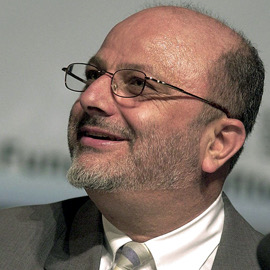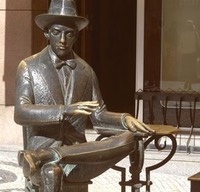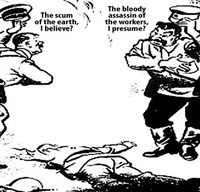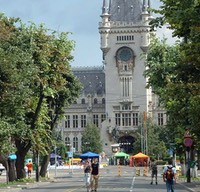Feature
The Securitate and me
By Vivid writer: Christopher Lawson
Posted: 30/12/2006
Vivid’s man in Iasi relates how he was implicated in the investigations that revealed Sorin Antohi’s Securitate past
Guildenstern: Our names shouted out in a certain dawn … a message ... a summons ... There must have been a moment, at the beginning, when we could have said no. But somehow we missed it. Well, we’ll know better next time.

Sorin Antohi, Securitate collaborator
Rosencrantz: We’ve done nothing wrong. We didn’t harm anyone. Did we?
Guildenstern: I can’t remember.
Guildenstern: All your life you live so close to truth it becomes a permanent blur in the corner of your eye. And when something nudges it into line it’s like being ambushed by a grotesque.
(Tom Stoppard: Rosencrantz and Guildenstern are Dead, 1967)
Since his resignation on 23 October, his name and title at his workplace have disappeared into cyberspace, although he has hardly been absent from the Romanian press over the past several weeks. I am belatedly adding to the column inches for an English-speaking audience, confident that Sorin Antohi’s cunning, calculating face will soon return to our television screens.
The former professor of history at the Soros-funded Central European University, Budapest, and founding director and principal fundraiser of Pasts Inc., the Institute of Historical Studies, resigned all his positions on 23 October when Ziarul de Iasi revealed that he had lied about a non-existent doctorate from the University of Iasi. A month before, he had published a lengthy confession in Cotidianul admitting that he had been an informer for the Securitate in his late teens and early twenties. Like more notorious figures such as Dan Voiculescu, he claimed that nobody had suffered as a result of his activities. Most shockingly, Antohi had also been a member of the CNSAS, the Council for the study of the Securitate archives (www.cnsas.ro), an independent body accountable to Parliament, until he resigned for “health reasons”.
As in all scandals from Profumo to Watergate, the cover-up rather than the case itself constitutes the real offence. The CNSAS, a commission appointed by Parliament six years ago to declassify and pass judgment on servants of the security forces, did not disclose Antohi’s collaborationist past. His records “disappeared”. An ambitious academic who became an authority on the oppressive past of his country, supposedly dedicated to the search for truth, is revealed as an opportunistic liar.
After all, he had had 16 years to come clean about his past as an informer for the communist secret police. In 1990, as a servant of the new Iliescu government, he had even presented himself as a long-time opponent of communism. The Romanian word for copper’s nark is turnator. Somehow the Zulu and Xhosa word impimpi (eng: collaborator, scab, spy) from the apartheid era, is more expressive.
Impimpi probably lied about his doctorate when the CEU hired him simply because he thought he could get away with it. Antohi, whose learning and intelligence blazes as brightly as his less admirable qualities, had completed nearly all of the formalities required for a doctorate except the defence itself. Universal acclaim greeted his books, although checks are being made on some of the publications he listed.
I write as someone named in his confession. But in the comparatively benign 1970s, as a British lecturer, I was a mere foreigner. My name has been plastered across the Romanian press linked to bird-brained allegations. But that’s the worst that’s happened to me.
Many Romanians suffered unspeakable horrors in the years between 1948 and 1964. As far as I am concerned, it is a badge of honour to be considered “hostile” to a system which had been responsible for the deaths of at least one million people in the whole country, intellectuals, believers of various faiths, village and factory leaders, and old-established families who had created modernity in a previous era.
A further quarter of a million had perished in state institutions, thousands on grandiose construction projects. Countless family members were traumatised. Individuals were kept in a state of permanent terror or forced into exile. Hundreds of thousands of womens’ lives were ruined by Elena Ceausescu’s lunatic ban on contraception and abortion. Even if this semi-literate, vindictive woman may not specifically have forbidden sex education, her actions created several generations of young women deprived of the most basic family planning procedures, many of whom died after botched abortions.
I came to Romania to further my career as a TESOL teacher. I wanted to work at university level, and, newly qualified, knew I would make myself interesting to future employers if I survived a two-year contract in a “difficult” communist country. I chose Romania because I felt that Romanian would be easier to learn than a Slav language.
Although British Council presence in Romania dates from 1938, when Bucharest was one of the first five cities where it set up an overseas office, government-inspired xenophobia reigned in the mid-Seventies. Many Romanians simply could not understand why foreigners came to live in the Socialist Republic. In what passed for humour at that time, British lecturers were told that they had had a reputation for being homosexuals, Jews or spies, or sometimes all three. This so-called joke neatly summed up the homophobia, anti-Semitism and paranoia prevalent in that decade.
Antohi, who was then a teenager still at high school, visited my apartment one Friday evening, and then came regularly. I had a large collection of LPs, which included the complete works of Bob Dylan, kept open house at weekends, and welcomed all and sundry. Most were university students. Antohi had no business coming. I did not know him at all. One of my students introduced him as a rock music fan.
After a number of further visits, when I assumed he was practising his (very good) school English, he started provocative, rather aggressive discussions, and assumed an air of over-familiarity. His behaviour became so strange that I soon smelt a rat. This pipsqueak was too transparent in his dedublarea (eng: duplicity) to be a good spy.
All the foreign lecturers were spied on, their telephones tapped, their letters opened, their conversations reported, their movements noted.
In this atmosphere I decided that my only recourse was to be myself. Antohi’s controller, a Securitate colonel, lived near the Zona Industriala, the location of my casa de oaspeti (eng: guest house.) It was very convenient for Antohi to visit both places. My file says I was “unduly sympathetic” to the “co-inhabiting nationalities”, especially the Transylavanian Saxons. Well, I spoke German and found the Saxons far more westernized than the average Romanian intellectual. One young Saxon in particular, an architecture student, visited frequently.
Most entertainingly, I “reported to the Cultural Attache at the British Embassy” and “recruited Romanians” for the service of Her Majesty.
Impimpi is the only possible source for this nonsense. As the heroic veteran dissident Doina Cornea points out, informers typically exaggerate so they appear invaluable to their bosses. In fact, I wrote one annual report each year of my stay about my working conditions at the university, and what it was like to live in Iasi. These reports, entirely concerned with educational matters, did not even name names. I delivered each of the two reports by hand to the British Embassy.
My teaching scrupulously avoided politics. Female students in my classes told me within the first two weeks which students in my classes were informers. My lessons contained only non-political themes, either literary or based on humanistic psychology, an intellectually shaky approach which nevertheless encouraged students to talk about their personal lives, their hopes and dreams. With the American lecturer, I projected documentary films from our embassies on an ancient Russian projector. We ran a borrowing library for students and started an English club for secondary school teachers and pupils.
With a group of dedicated first-year students, I put on three dramatic evenings at the Casa Tineretului, as it was then called. I scoured the work of modern British dramatists to find non-political material, and lighted on Tom Stoppard. A short play A Separate Peace, which concerned a mysteriously healthy man who checked into a hospital formed the centrepiece. The would-be patient just wanted to be looked after by pretty, sympathetic nurses. A brief biography and short extracts from other Stoppard plays made up the rest of the evening.
I was just in time. That summer in London saw a performance of Every Good Boy Deserves a Favour. Andre Previn had challenged Stoppard to put on a play containing a symphony orchestra. The Czech-born playwright chose a Russian prison camp as his setting.
Antohi went on to study English at Cuza University, when he wihdrew from his work for the Securitate. Subsequently he was resident at the Universities of Michigan and Bielefeld and one of the universities in Montpelier. He wrote and published voluminously.
Central and East European, as well as Russian poets have always had a special relationship with Shakespeare’s Hamlet, the almost-definitive version of which was first performed in 1601 in the dying years of the Elizabethan police state. Sir Francis Walsingham, Elizabeth’s spymaster, had set up and run a tentacular network of secret agents from Rheims to Constantinople to prevent Catholic assassination plots against the Virgin Queen. Modern writers from the then-communist states instantly recognised and identified with Elsinore, a walled city seething with spies, and reserved especial scorn for Rosencrantz, Guildenstern and Polonius.
Antohi, described by his erstwhile colleagues as a shining light of Romanian intellectual life, may have fallen like Lucifer, although his demise hardly ranks as Shakespearean tragedy. When the Treens invade Romania from the planet Venus as the first step to world domination, he will certainly re-emerge as National Security Adviser to the Mekon. Even as a scared 19-year-old, he could have said No. Am I sympathetic to his self-induced plight? I quote the Danish prince on the fate of the attendant lords: “Why, man, they did make love to this employment. They are not near my conscience.”










